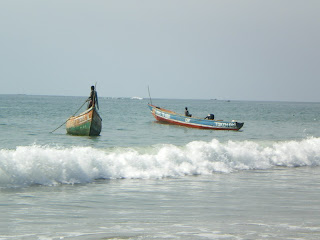Hey everybody! As my service here comes to an end, I thought I would review what I was glad I brought with me, and what I wish I had brought instead. PC issues a suggested packing list, but we all agree that its kind of dumb. But since changing it would involve going through Washington DC (seriously, we checked), I thought I would just post one of my own(to be considered IN ADDITION to the one offered by PC) for anyone considering PC in Sub Saharan Africa.
Things I’m glad I brought
My laptop--really good for storing pics, being able to work at home, and watching movies. Wifi is increasingly available in The Gambia, you’re going to want a laptop. Also came in handy for radio project I did with my students.
An extra battery for my laptop--it was nice to be able to have an extra couple of hours of power between charging. Everyone I knew who had one of those big, expensive solar batteries that can power a laptop said that they didn’t work. Its better to rig something up here with a car battery, or make your own solar set-up once you get here. Or as I did, just have an extra battery you can charge when you ARE near power.
Ipod and speakers
Headlamps
Digital camera
Solio--little solar panel charger. It takes about 8 hours in the sun to get a full charge, and from it I can charge my cell phone and ipod without needing to go searching for an outlet. Some people said that their Solio broke in the rain. Mine has been rained on plenty of times and is still going strong.
My own pillow--pillows in this country are terrible.
A fleece blanket--believe it or not, January and February nights are chilly
Sturdy sandals--I prefer Keen, but lots of people seem to like Chacos. Both of these companies provide discounts to PCVs, so take advantage of that.
Toiletries--deodorant, tampons, and razors are all available here, but they are expensive. Its better to load up on that stuff at home when it goes on sale. Ten sticks of deodorant for a $1 each is going to feel WAY better than buying one every month or so for the equivalent of $4 on your PC living allowance.
Things I wish I had brought
A French press--Nescafe is yucky.
More solid colored plain t-shirts
Knife sharpener
One pair of nice heals. Oh wait, I did bring that. And when my bag was too big, they were one of the first things to be ditched. I still think about them all lonely next to the airport trash can.
More food from home--seriously, this is what you should fill your bags with. Food for training, and other stuff you can’t get here. Chai tea, drink/soup/sauce mixes, real coffee, real chocolate, dried fruit. Etc.
Things that I didn’t need
Don’t bring so many clothes, you can just have things made here, or go shopping in the “dead white man’s clothes” (clothes donated to Goodwill, then sold to developing countries).
DON’T bring so many professional clothes, no matter what the stupid packing list says. I still have some nice slacks and button-down shirts that I haven’t worn yet. Its just too hot. Most of us just don’t work in offices, so why feel uncomfortable all the time? For women, conservative sun dresses are better, or I’m sure you’ll have things tailored. For men, a few pairs of khakis and a couple of button-downs will be fine.
Hiking boots/sturdy shoes--I can only think of 2 times that I wore sturdy shoes. The rest of the time I wore flip-flops. It’s just too hot for closed-toed shoes. And if you’re going in and out of people’s houses, you’re going to be lacing them up and off all the time.
Cell phone--yes, you can bring an unlocked phone from the states to use here, but I don’t think that it was worth it. The internet capabilities on my phone weren’t compatible with the internet offerings here, and it wasn’t as sturdy. The nokia phones here are cheap($35-$40), durable, and come with a handy-dandy flashlight function that you will use every single day.















































.jpg)






